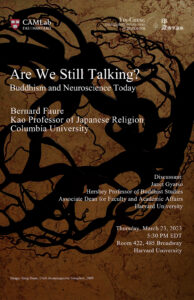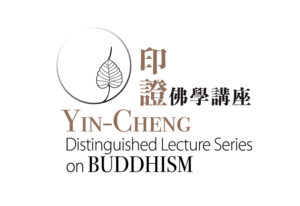Time: March 23, 2:30 pm (Vancouver) | 5:30 pm (New York) | 9:30 pm (London) | March 24, 5:30 am (Beijing/Taipei)
Room 422, 485 Broadway, Harvard University
YouTube Live stream (see below)
Prof. Bernard Faure’s lecture in English
Abstract: Over the past three decades, since the creation of the Mind and Life Institute in the 80s, a series of conferences have introduced the idea of a convergence between Buddhism and neuroscience. Neuroscientists have been particularly interested in the possible neural correlates of Buddhist meditation, and their experiments have contributed to the current popularity of Mindfulness and derived techniques, such as “Mindfulness-Based Stress Reduction.” Apart from meditation, a number of important issues, such as notions of self and non-self, or Buddhist ethics and neuroethics, have been discussed. Yet, because of the media attention and a desire to reach consensus, problems and disagreements between the two fields have sometimes been ignored or downplayed, and the conversation has been limited to certain forms of Buddhist thought and practice. The time has come to move “beyond the hype” and to engage in a broader and more critical discussion.
About the Speaker:
 Bernard Faure is, since 2006, the Kao Professor of Japanese Religion in the Departments of Religion and East Asian Languages and Cultures at Columbia University. Before that, he was the George Edwin Burnell Professor of Religious Studies at Stanford University. He received his Ph.D. in Asian Literature from the Institut National des Langues Orientales Vivantes (Paris) in 1984. He specializes in the Chinese and Japanese Buddhist Traditions. He is the author of a number of books in English and French, Including The Rhetoric of Immediacy, Chan Insights and Oversights, The Red Thread, The Power of Denial, Visions of Power, Unmasking Buddhism, and, more recently, the first two volumes of a series of works on the gods of medieval Japan, The Fluid Pantheon and Protectors and Predators, both published by the University of Hawai‘i Press. He has also recently finished a book in French, The Thousand and One Lives of the Buddha—From Ancient India to the Modern Western Novels and Science Fiction.
Bernard Faure is, since 2006, the Kao Professor of Japanese Religion in the Departments of Religion and East Asian Languages and Cultures at Columbia University. Before that, he was the George Edwin Burnell Professor of Religious Studies at Stanford University. He received his Ph.D. in Asian Literature from the Institut National des Langues Orientales Vivantes (Paris) in 1984. He specializes in the Chinese and Japanese Buddhist Traditions. He is the author of a number of books in English and French, Including The Rhetoric of Immediacy, Chan Insights and Oversights, The Red Thread, The Power of Denial, Visions of Power, Unmasking Buddhism, and, more recently, the first two volumes of a series of works on the gods of medieval Japan, The Fluid Pantheon and Protectors and Predators, both published by the University of Hawai‘i Press. He has also recently finished a book in French, The Thousand and One Lives of the Buddha—From Ancient India to the Modern Western Novels and Science Fiction.
Discussant:

Janet Gyatso is a specialist in Buddhist studies with concentration on Tibetan and South Asian cultural and intellectual history. Her 2015 book Being Human in a Buddhist World: An Intellectual History of Medicine in Early Modern Tibet (Columbia University Press) focuses upon alternative early modernities and the conjunctions and disjunctures between religious and scientific epistemologies in Tibetan medicine in the sixteenth–eighteenth centuries. Her other books include Apparitions of the Self: The Secret Autobiographies of a Tibetan Visionary; In the Mirror of Memory: Reflections on Mindfulness and Remembrance in Indian and Tibetan Buddhism; and Women of Tibet.
She has also been writing on sex and gender in Buddhist monasticism, and on the current female ordination movement in Buddhism. Previous topics of her scholarship have included visionary revelation in Buddhism; lineage, memory, and authorship; the philosophy of experience; and autobiographical writing in Tibet. Her current writing concerns the phenomenology of living well with animals and related ethical issues and practices.
Gyatso was elected to the American Academy of Arts and Science in 2018. She was president of the International Association of Tibetan Studies from 2000 to 2006, and co-chair of the Buddhism Section of the American Academy of Religion from 2004 to 2010. She teaches lecture courses and advanced seminars on Buddhist history, ritual, and ideas, and on Tibetan literary practices and religious history.
See original post on Harvard CAMLab
About the Yin-Cheng Distinguished Lecture Series: Launched in September 2021, the Yin-Cheng Distinguished Lecture Series (印證佛學傑出學術系列講座) is a collaborative, multi-university partnership between Peking University, University of Oxford, University of Cambridge, Inalco (Institut national des langues et civilisations orientales), Princeton University, Harvard University, and the University of British Columbia. The Lecture Series is established in honour of Venerable Cheng-yen 證嚴, founder of Tzu Chi, and her mentor Yinshun 印順 (1906–2005), with the goal of promoting topics in Buddhist Studies.
Click here to download the poster











